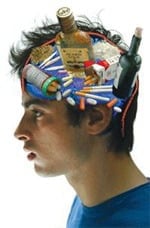Alcohol Withdrawal Symptoms
 (from alcohol withdrawal site)
(from alcohol withdrawal site)
Mild-to-moderate psychological symptoms:
- Anxiety or nervousness
- Depression
- Difficulty thinking clearly
- Fatigue
- Irritability or easy excitability
- Jumpiness or shakiness
- Nightmares
- Rapid emotional changes
Mild-to-moderate physical symptoms:
- Clammy skin
- Enlarged (dilated) pupils
- Headache
- Insomnia (sleeping difficulty)
- Loss of appetite
- Nausea and vomiting
- Pallor
- Rapid heart rate
- Sweating
- Tremor of the hands or other body parts
Heroin Withdrawal Symptoms
[Withdrawal symptoms are often described as] feeling like a severe case of flu. They include:
- Uneasiness
- Irritability
- Crying
- Tremors
- Jitteriness
- Goose bumps
- Runny nose
- Yawning
- Weight loss
- Abdominal cramps
- Diarrhea
- Severe craving
Cocaine Withdrawal Symptoms
(from cocaine withdrawal site)
The following represents a list of common cocaine withdrawal symptoms:
- Fatigue
- Depression
- Lack of pleasure
- Generalized malaise
- Anxiety
- Vivid and unpleasant dreams
- Increased appetite
- Irritability
- Slowing of activity
- Agitation and restless behavior
- Sleepiness
- Extreme suspicion
[Discussion from drug site] Although cocaine withdrawal does not typically have visible physical symptoms like “the shakes” and vomiting that are common with heroin or alcohol withdrawal, the level of depression, lack of pleasure, and craving caused by cocaine withdrawal equals or surpasses what is experienced with most other withdrawal symptoms. The good news is that cocaine withdrawal symptoms can disappear completely over time. The bad news, however, is twofold. First, if the abuse has been chronic, various symptoms such as depression and craving can actually last for months. …
To understand why discontinuing cocaine use leads to agitation and other unpleasant withdrawal symptoms, it is necessary to briefly discuss the relationship between dopamine and cocaine. Dopamine is one of the brain’s natural “pleasure” neurochemicals. Cocaine abuse interferes with the reabsorption of dopamine, thus leading to a surplus of dopamine in the brain.